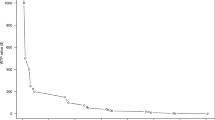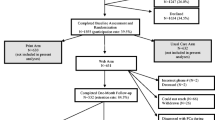Abstract
OBJECTIVE: To assess the effect of video and pamphlet interventions on patient prostate cancer (CaP) screening knowledge, decision-making participation, preferences, and behaviors.
DESIGN: Randomized, controlled trial.
SETTING: Four midwestern Veterans Affairs medical facilities.
PATIENTS/PARTICIPANTS: One thousand, one hundred fifty-two male veterans age 50 and older with primary care appointments at participating facilities were randomized and 893 completed follow-up.
INTERVENTIONS: Patients were randomized to mailed pamphlet, mailed video, or usual care/control.
MEASUREMENTS AND MAIN RESULTS: Outcomes assessed by phone survey 2 weeks postintervention included a 10-item knowledge index; correct responses to questions on CaP natural history, treatment efficacy, the prostate-specific antigen (PSA)’s predictive value, and expert disagreement about the PSA; whether screening was discussed with provider; screening preferences; and PSA testing rates.
Mean knowledge index scores were higher for video (7.44; P=.001) and pamphlet (7.26; P=.03) subjects versus controls (6.90). Video and pamphlet subjects reported significantly higher percentages of correct responses relative to controls to questions on CaP natural history (63%, 63%, and 54%, respectively); treatment efficacy (19%, 20%, and 5%), and expert disagreement (28%, 19%, and 8%), but not PSA accuracy (28%, 22%, and 22%). Pamphlet subjects were more likely than controls to discuss screening with their provider (41% vs 32%; P=.03) but video subjects were not (35%; P=.33). Video and pamphlet subjects were less likely to intend to have a PSA, relative to controls (63%, 65%, and 74%, respectively). PSA testing rates did not differ significantly across groups.
CONCLUSIONS: Mailed interventions enhance patient knowledge and self-reported participation in decision making, and alter screening preferences. The pamphlet and video interventions evaluated are comparable in effectiveness. The lower-cost pamphlet approach is an attractive option for clinics with limited resources.
Similar content being viewed by others
References
American Cancer Society. Cancer Facts and Figures—2001. 5008.01. Atlanta, Ga: American Cancer Society; 2001.
American College of Physicians. Clinical guideline: screening for prostate cancer. Ann Intern Med. 1997;126:480–4.
Office of Technology Assessment. Costs and effectiveness of prostate cancer screening in elderly men. OTA-BP-H-145. Washington DC: U.S. Government Printing Office; 1995.
Smith RA, Cokkinides V, Eyre HJ. American Cancer Society Guidelines for the Early Detection of Cancer, 2003. CA Cancer J Clin. 2003;53:27–43.
U.S. Preventive Services Task Force. Screening for prostate cancer: recommendation and rationale. Ann Intern Med. 2002;137:915–6.
Wilkins EG, Lowery JC, Hamill JB. Patient preferences in PSA screening: the impact of shared decision-making videos. Abstract presented at the 17th annual VA Health Sciences Research and Development Meeting, Washington, DC. 1999.
Frosch DL, Kaplan RM, Felitti V. Evaluation of two methods to facilitate shared decision making for men considering the prostate-specific antigen test. J Gen Intern Med. 2001;16:391–8.
Volk RJ, Cass AR, Spann SJ. A randomized controlled trial of shared decision making for prostate cancer screening. Arch Fam Med. 1999;8:333–40.
Flood AB, Wennberg JE, Nease RF Jr, Fowler FJ Jr, Ding J, Hynes LM. The importance of patient preference in the decision to screen for prostate cancer. J Gen Intern Med. 1996;11:342–9.
Wolf AMD, Nasser JF, Wolf AM, Schorling JB. The impact of informed consent on patient interest in prostate-specific antigen screening. Arch Intern Med. 1996;156:1333–6.
Schapira MM, VanRuiswyk J. The effect of an illustrated pamphlet decision-aid on the use of prostate cancer screening tests. J Fam Pract. 2000;49:418–24.
Wilt TJ, Paul J, Murdoch M, Nelson D, Nugent S, Rubins H. Educating men about prostate cancer screening: a randomized trial of a mailed pamphlet. Eff Clin Pract. 2001;4:112–20.
Davison BJ, Kirk P, Degner LF, Hassard TH. Information and patient participation in screening for prostate cancer. Patient Educ Couns. 1999;37:255–63.
Bandura A. Social Foundations of Thought and Action: A Social Cognitive Theory. 13th ed. New Jersey: Prentice-Hall; 1986.
Partin MR, Dillon N, Haas M, Wilt TJ. “The PSA Test for Prostate Cancer: Is It Right for ME?” Minneapolis, Minn: Minneapolis VA Medical Center; 2002.
Radosevich DM, Partin MR, Nugent S, et al. Measuring patient knowledge of the risks and benefits of prostate cancer screening. Patient Educ Couns. 2004;54:in press.
Barry MJ, Fowler FJ Jr, O’Leary MP, et al. The American Urological Association symptom index for benign prostatic hyperplasia. J Urol. 1992;148:1549–57.
Rosenbaum PR, Rubin DR. The central role of the propensity score in observational studies for causal effects. Biometrika. 1983;70:41–5.
Partin MR, Wilt TJ. Informing patients about prostate cancer screening: identifying and meeting the challenges while the evidence remains uncertain. Am J Med. 2002;113:691–3.
Author information
Authors and Affiliations
Corresponding author
Additional information
A portion of the results included in this manuscript was presented at: (1) the Sixth Annual Minnesota Health Services Research Conference, February 26, 2002, Minneapolis Minn, (2) the 21st Annual VA Health Services Research Meeting, February 2003, Washington, DC, and (3) the 24th Annual Conference on Patient Education jointly sponsored by the Society of Teachers of Family Medicine and the American Academy of Family Physicians, November 23, 2002, Fort Lauderdale, Fla.
Funded by VA Health Services Research and Development Service grant #IIR 99 277-1 to the Center for Chronic Disease Outcomes Research, Veterans Affairs Medical Center, Minneapolis Minn.
Rights and permissions
About this article
Cite this article
Partin, M.R., Nelson, D., Radosevich, D. et al. Randomized trial examining the effect of two prostate cancer screening educational interventions on patient knowledge, preferences, and behaviors. J GEN INTERN MED 19, 835–842 (2004). https://doi.org/10.1111/j.1525-1497.2004.30047.x
Issue Date:
DOI: https://doi.org/10.1111/j.1525-1497.2004.30047.x




